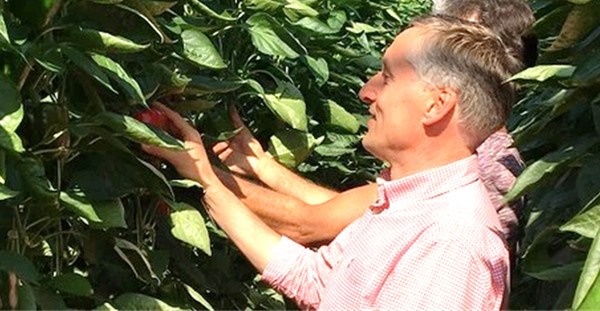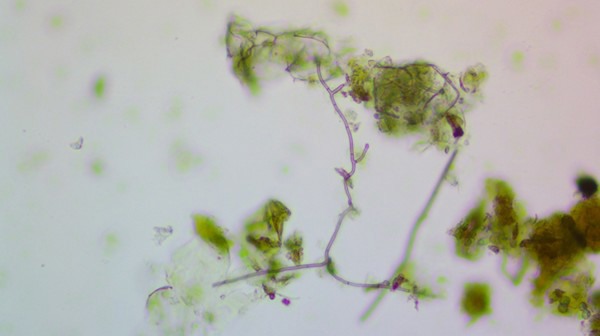Last year, Aldo van Os and Mark Velders of The Conscious Farmer (TCF) told us about their search for the (real) cause of a ToBRFV infection. At the time, they were working with a tomato grower to get the Tomato brown rugose fruit virus under control.
Now, a few months later, Aldo proudly reports: "Our search was not in vain, the grower in question effectively eradicated the virus with the help of our customized protocol. And even better, with the same protocol they also managed to control the Cucumber Green Mottle Mozaik Virus (CGMMV). That was not seen before at this customer." A similar protocol also helped another grower, with a different problem. Mark: "This grower had a Pythium problem. With our protocol the drop out rate due to this fungus reduced from more than 10% to 1-2%."
Way of working
In this article Aldo and Mark elaborate on their way of working, how they get to the heart of the matter together with the growers, make significant savings on biological control and labour costs, enable the successful use of liquid fertilisers in organic farming and how they teach growers to assess the quality of their compost or compost tea themselves using the Quick Scan developed by TCF. The gentlemen laugh: "We are not sitting still, as you can see."

TCF consultant Aldo van Os in the greenhouse together with the customer
Since the partnership was founded in 2018, the consultants from The Conscious Farmer have been visiting their customers on a regular basis, and then work with them for several days. "Working and coaching 'on the job' with the business owners and growers," Aldo points out. "In this way, the whole palette of the organic greenhouse operation can be addressed and we get to the heart of the matter, whether it is pest control, the watering strategy, soil improvement and fertilisation or work planning and cost control. We can offer this holistic and intensive approach based on now more than 30 years of experience from both myself and Mark."
Savings in biological pest control
Biological pest control is an art in itself, Aldo says: "It requires constant attention and good planning. Together with the growers, we make an annual plan with every possible pest and biological control agent for each season or period. In this way, you have 95% of all cases covered in advance." Mind you, for every greenhouse, for every location, this is slightly different according to Mark and Aldo. It is crucial to introduce pesticides in the right way, at the right time, and preventively. Not only for your efforts to be effective, but also to keep the costs under control. The result, according to Aldo: "The costs of biological pest control are significantly reduced. What certainly helps is that we are independent advisors. We do not have a fixed relationship with certain suppliers."
Saving on labor costs
"Work efficiency is our spearhead," Aldo continues, "With a longer, more intensive visit you can see how people perform their tasks, how they work together, where the motivation sits, and where it doesn't." This is how TCF has come to work in smaller task-oriented teams at many a customer. "Making people responsible for a particular work or task." According to Aldo, this improves the quality of work and motivation, and because of the efficiency, the customer saves on labor costs. So the knife cuts both ways, Mark summarises. "It's a hot topic at the moment, labor costs, due to a scarcity of good workers on the market."
Liquid fertilizer, now also well possible in organic farming
Working with liquid fertilizers is standard practice in conventional greenhouse horticulture, where cultivation is only done on the substrate. Abroad, organic growers are also allowed to grow on substrates, Mark points out. These substrate growers, as he calls them, foreign customers of TCF, also prefer to work with liquid fertilizers. "However, this is not always so easy and quite often fails. One of our customers sought our help after a failed bell pepper harvest. We sought cooperation with NovaCropControl and now calculate and fine-tune the recipe of the liquid biological fertilizers on the basis of plant sap, drip, and drain analyses. With great success. It was a fair bit of fitting and measuring with the recipe, because you never know exactly how an organic fertilizer behaves, but the plants are doing quite well this year."
Quick Scan compost and compost tea
Mark continues this update full of developments and comes to one of his favorite topics, compost. "Compost is generally used to improve soil structure. But a good compost can do much more in terms of feeding and protecting the plant. And this depends on the biological quality in particular. Is there enough life in the compost, and is it sufficiently diverse? All the pieces of the microbiological puzzle must be present for compost to do its beneficial work," he explains enthusiastically.
But how does a grower know if the compost and compost tea they are using are of sufficient quality? The TCF consultants have developed a method for this in which they also train the growers. "By means of a simple microscopic Quick Scan, a grower has an indication of the quality of his compost in less than an hour", Mark indicates. "Fast enough so that he can still make adjustments in the making of his compost or compost tea or tell the supplier to come up with a better product."
Mark closes the topic with a warning. "Occasionally we come across a compost tea that is not only toxic to the plants in the greenhouse but also to humans." The gentlemen from TCF, therefore, advise their growers not to let compost or compost tea into the greenhouse without such a quick assessment. You can also make your own compost. Aldo: "We provide online training and workshops on how to assess and make biologically active compost and compost tea yourself."

Under the microscope: a positive fungus that aggregates soil particles
For more information:
TCF Consultancy 
www.theconsciousfarmer.org
[email protected]
+49 (0) 5632 966 7590
Aldo van Os
+31 (0)6 82 06 60 12
Mark Velders
+974 74 09 64 59
